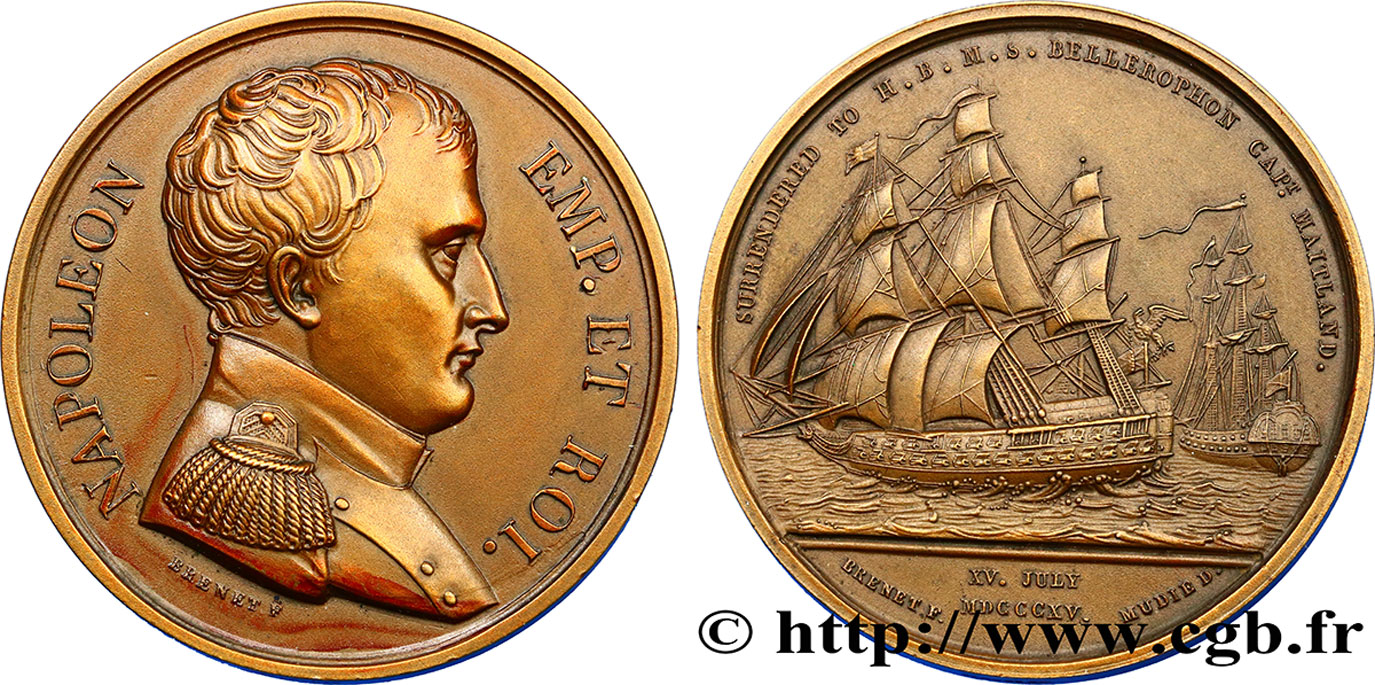fme_400038 - LES CENT JOURS / THE HUNDRED DAYS Médaille, Reddition de Napoléon
Not available.
Item sold on our e-shop (2017)
Price : 75.00 €
Item sold on our e-shop (2017)
Price : 75.00 €
Type : Médaille, Reddition de Napoléon
Date: 1815
Mint name / Town : 75 - Paris
Metal : bronze
Diameter : 41 mm
Orientation dies : 12 h.
Engraver BRENET Nicolas-Guy-Antoine (1773-1846) - MUDIE James (1779-1852)
Weight : 41 g.
Edge : lisse + corne BRONZE
Coments on the condition:
Refrappe moderne, avec de beaux reliefs et une agréable patine brune
Obverse
Obverse legend : NAPOLÉON EMP. ET ROI.
Obverse description : Buste de Napoléon à droite.
Reverse
Reverse legend : SURRENDERED TO H. B. M. S. BELLEROPHON CAPT MAITLAND. // XV. JULY / MDCCCXV.
Reverse description : Bataille navale mettant en scène le Bellerophon .
Commentary
Devant le rapprochement de Paris des armées de la septième Coalition, Napoléon quitte le palais le 25 juin pour le château de Malmaison puis le 29 il prend la route incognito en calèche isolée (habillé en bourgeois) pour Rochefort, puis Fouras, où l'attendent deux frégates la Saale et la Méduse, souhaitant rejoindre les États-Unis. Le 8 juillet, il embarque pour l'île d'Aix et monte à bord de la Saale. François Ponée, commandant de La Méduse offrit à l'empereur de combattre le Bellerophon, pendant que la Saale commandée par Pierre Philibert passerait. Mais Philibert refusa de jouer ce rôle qui lui était réservé. Joseph Fouché, président du gouvernement provisoire, alerte les Britanniques sur les risques de fuite de Napoléon. Plusieurs corvettes anglaises escortant le vaisseau le Bellerophon sont dépêchées dans le pertuis d'Antioche, contraignant Napoléon à négocier.
Demandant l'asile au « plus constant de ses ennemis », l'Angleterre, il est d'abord pris en charge par le Bellerophon, puis transféré le 7 août 1815 sur le Northumberland qui le déposera à Sainte-Hélène. On ne lui donne pas l'occasion de poser le pied en Angleterre, les ministres britanniques voulant absolument éviter que Napoléon puisse demander le droit d'asile en invoquant l'Habeas Corpus.
C'est le dernier service en mer du Bellerophon qui est décommissioné et transformé en ponton d'emprisonnement en 1815, puis rebaptisé HMS Captivity en 1824 afin de libérer le nom pour un autre navire. Déplacé à Plymouth en 1826, il est en service jusqu'en 1834, lorsque les derniers détenus le quittent. L'Amirauté le vend en 1836 et il est démoli..
Demandant l'asile au « plus constant de ses ennemis », l'Angleterre, il est d'abord pris en charge par le Bellerophon, puis transféré le 7 août 1815 sur le Northumberland qui le déposera à Sainte-Hélène. On ne lui donne pas l'occasion de poser le pied en Angleterre, les ministres britanniques voulant absolument éviter que Napoléon puisse demander le droit d'asile en invoquant l'Habeas Corpus.
C'est le dernier service en mer du Bellerophon qui est décommissioné et transformé en ponton d'emprisonnement en 1815, puis rebaptisé HMS Captivity en 1824 afin de libérer le nom pour un autre navire. Déplacé à Plymouth en 1826, il est en service jusqu'en 1834, lorsque les derniers détenus le quittent. L'Amirauté le vend en 1836 et il est démoli..








 Report a mistake
Report a mistake Print the page
Print the page Share my selection
Share my selection Ask a question
Ask a question Consign / sell
Consign / sell
 Full data
Full data



